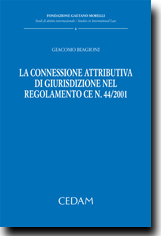 Giacomo Biagioni (Univ. of Cagliari) has recently published “La connessione attributiva di giurisdizione nel regolamento CE n. 44/2001” (CEDAM, 2011). The volume is the latest in the series “Studi di diritto internazionale – Studies in international law“, focused on international procedural law and international civil procedure law, promoted by the Fondazione Gaetano Morelli, a foundation dedicated to the memory of one of the most influential Italian international law scholars of the past century.
Giacomo Biagioni (Univ. of Cagliari) has recently published “La connessione attributiva di giurisdizione nel regolamento CE n. 44/2001” (CEDAM, 2011). The volume is the latest in the series “Studi di diritto internazionale – Studies in international law“, focused on international procedural law and international civil procedure law, promoted by the Fondazione Gaetano Morelli, a foundation dedicated to the memory of one of the most influential Italian international law scholars of the past century.
An abstract has been kindly provided by the author (the complete table of contents is available on the publisher’s website):
Both in civil law and in common law systems, reference is made to connexity when it is deemed advisable to defer to one court related claims so that they may be jointly examined and adjudicated. Connexity can also work as a head of jurisdiction: in those cases a State is conferred jurisdiction on one claim («related claim») since it is connected to another claim («main claim») that falls already under the jurisdiction of that State.
The book addresses that category of provisions as enshrined in the EC regulation No 44/2001, evaluating their scope of application, their conditions of application and their effects. Those heads of jurisdiction fit especially well into the EC regulation No 44/2001. The book emphasises that the principle of free circulation of judgments is the main objective pursued by the regulation and that even the system of provisions about jurisdictional competence must be interpreted in the light of that aim.
In the regulation No 44/2001 the notion of “related actions” may then have two different meanings: some provisions (mainly article 6) recall the connectedness between two claims as a ground for conferring jurisdiction to one court over both claims; article 28 enables the court second seised to stay proceedings while the proceedings in the State first seised come to an end. Even though those provisions operate differently, they pursue two common purposes, namely they aim at preventing the risk of irreconcilable judgments and contribute to procedural economy. The book argues for a broad interpretation of heads of jurisdiction based on connexity, insofar they can lead to improve the sound administration of justice and to avoid conflicting judgments.
However, it must be borne in mind that the regulation No 44/2001 does not consider connexity a general head of jurisdiction. It contains some special provisions about connected claims; those provisions differ from each other for their scope of application ratione materiae and for their procedural requirements. Even the notion of connectedness does not have a uniform meaning in the regulation: every single provision emphasises different functions of the jurisdiction on the ground of connexity. Some provisions are especially aimed at preventing irreconcilable judgments, like article 6(1) of the regulation; others have a wider scope and pursue procedural economy, like article 6(2). However, those heads of jurisdiction are subject to some limits. In particular, the jurisdiction should not be conferred on the ground of connexity, whenever a provision of the regulation inspired by more prominent values (like the protection of the weaker party, the sovereignty of Member States in some matters and the principle of party autonomy) is applicable.
Title: “La connessione attributiva di giurisdizione nel regolamento CE n. 44/2001“, by Giacomo Biagioni, CEDAM (Padova), 2011, XIV – 268 pages.
ISBN: 978-88-13-30763-9. Price: EUR 27. Available at CEDAM.
 The Hague Conference has announced that the Hague Prize for International Law 2011 will be awarded to Professor Paul Lagarde “in view of [his] outstanding contribution to the study and promotion of private international law”.
The Hague Conference has announced that the Hague Prize for International Law 2011 will be awarded to Professor Paul Lagarde “in view of [his] outstanding contribution to the study and promotion of private international law”.


